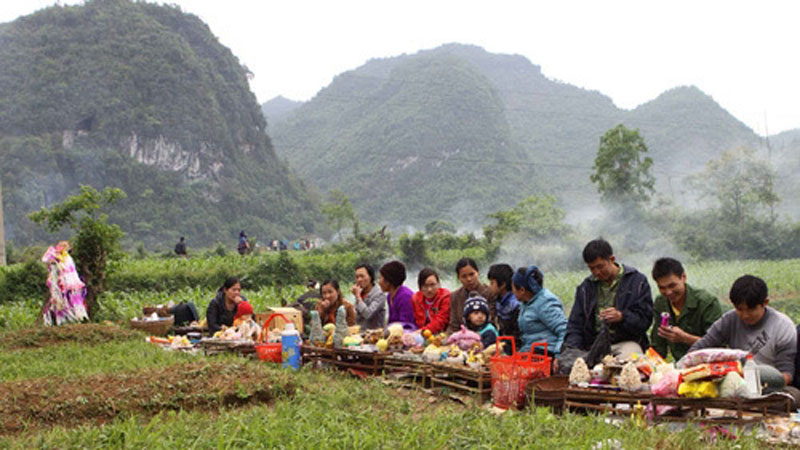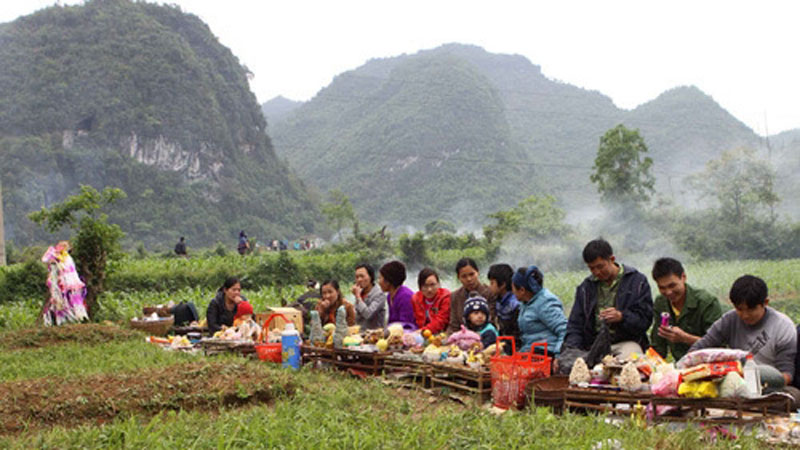
The Thanh Minh (grave-visiting) festival, which falls on the third day of the third lunar month, is one of the most important festivals of the Tay and Nung ethnic groups as it is a celebration to remember the credits of parents, ancestors and the dead.
Families preparing trays of offerings for ancestors at Thanh Minh festival
In the Tay and
Nung people’s belief, Thanh Minh festival is a time for family reunion, no
matter where they are living or working far from hometown, they always return
home ahead of the festival to join their other family members on the occasion.
One day ahead of the festival, each family
prepares a tray of offerings, the more number of households the family has, the
more abundant their offerings will be.
In the northern province of Cao Bang, from early
in the morning of the opening day, people flock to the hillsides and mountain
sides, where the graveyard and cemeteries are located, carrying their
offerings, such as boiled chicken, pork, fruits, votive papers, eggs, wine, and
coloured sticky rice, including the two indispensable colours of black and red.
The colours of the sticky rice are made from
leaves grown in the locales’ gardens. Not only producing natural and
eye-catching colours, the leaves also bring a distinctive aroma to the dish.
As a celebration to pay tribute to the dead, the
villagers also clean up and burn incense for unmarked graves during the
festival.
After the visiting ritual, the family members
gather together to enjoy the offerings and hold exchanges with other families.
The festival is also observed among Tay and Nung
ethnic communities in Binh Phuoc, Binh Duong, and other South-eastern
provinces, during which worshippers prepare ‘may nhuong’ (steamed bamboo
shoots filled with minced pork) as an essential offering for their ancestors.
Source: NDO
With an increasingly vibrant and widespread emulation movement aimed at building cultured residential areas and cultured families, Yen Thuy District has been making steady progress toward improving both the material and spiritual well-being of its people, while fostering a civilized, prosperous, beautiful, and progressive community.
Once lacking recreational spaces and community facilities, Residential Group 2 in Quynh Lam Ward (Hoa Binh City) has recently received attention for the construction of a new, spacious, and fully equipped cultural house. The project followed the model of state support combined with public contributions in both labor and funding.
The "All people unite to build cultural life" movement, which has been effectively integrated with Kim Boi district’s socio-economic development goals, is fostering a lively spirit of emulation across local residential areas, hamlets, villages, public agencies, and enterprises. In addition, through the initiative, traditional cultural values are being preserved and promoted, while community solidarity and mutual support in poverty reduction and economic development are being strengthened.
A working delegation of the Hoa Binh provincial People’s Committee led by its Permanent Vice Chairman Nguyen Van Toan on June 11 inspected the progress of a project to build the Mo Muong Cultural Heritage Conservation Space linked to tourism services in Hop Phong commune, Cao Phong district.
Born and growing in the heroic land of Muong Dong, Dinh Thi Kieu Dung, a resident in Bo town of Kim Boi district, in her childhood was nurtured by the sweet lullabies of her grandmother and mother. These melodies deeply imprinted on her soul, becoming an inseparable part of her love for her ethnic group's culture. For over 20 years, this love for her hometown has driven Dung to research, collect, and pass down the cultural values of the Muong people to future generations.
In the final days of May, the Ethnic Art Troupe of Hoa Binh Province organized performances to serve the people in remote, mountainous, and particularly disadvantaged areas within the province. These were not just ordinary artistic shows, but they were the meaningful journeys aimed at spreading cultural values, enhancing the spiritual life of the people and contributing to the preservation of ethnic minority cultural identities.



